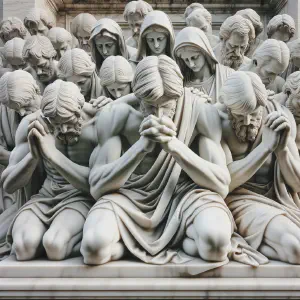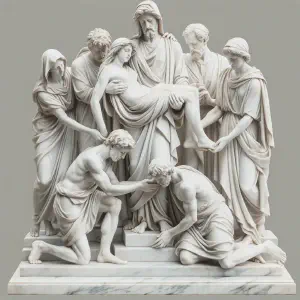The Unshakable Foundation
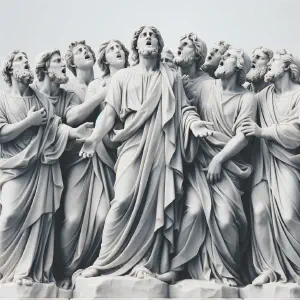
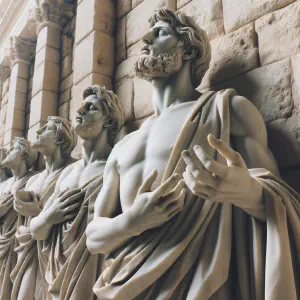
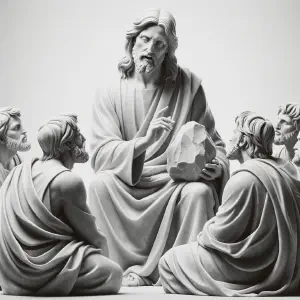
The story culminated in a profound lesson about the essence of faith. It was not merely about the strength of physical walls or the beauty of songs sung in praise. True faith was about building one’s life on the teachings of Jesus, the rock-solid foundation that endures beyond worldly structures and fleeting accolades. In this tale of faith, wisdom, and action, the path to salvation was clear: seek the Lord earnestly, act justly, and build your life on the eternal Rock.
Five Questions
What is the significance of the strong city mentioned in Isaiah 26, and how does it relate to faith?
The strong city in Isaiah 26 symbolizes a community fortified by trust and faith in God. It’s not just about physical walls and defenses, but about the spiritual strength derived from faithfulness and justice. This imagery reflects the idea that true security and peace come from a collective trust in God’s protection and guidance.
How does the refrain “Blessed is he who comes in the name of the Lord” in Psalm 118 contribute to the overall theme of these scriptures?
This refrain emphasizes the joy and blessing found in welcoming God into our lives. It serves as a reminder that seeking refuge in the Lord, rather than in human entities, brings about true salvation and mercy. This idea resonates with the theme of finding strength and protection in divine guidance, as opposed to relying solely on worldly means.
In Matthew 7, Jesus talks about building a house on rock versus sand. What does this metaphor teach us about living out our faith?
Jesus uses this metaphor to illustrate the importance of not only hearing His words but acting on them. Building our lives on the teachings of Jesus, the rock, represents establishing a strong, enduring foundation of faith that can withstand life’s trials. In contrast, building on sand, or merely professing faith without action, leads to instability and eventual downfall.
How do these passages collectively convey the message about the relationship between faith, action, and salvation?
Collectively, these passages convey that faith is more than just belief; it’s about action and living in accordance with God’s will. They teach us that salvation is not guaranteed by faith alone but requires us to act justly, seek God’s refuge, and build our lives on the teachings of Jesus. This relationship underscores the idea that our actions, grounded in faith, are crucial in our spiritual journey towards salvation.
What can modern believers learn from the contrast between the lofty city brought low and the needy trampling it underfoot, as described in Isaiah 26?
This contrast serves as a powerful reminder of God’s justice and the transient nature of worldly power and pride. It teaches modern believers about humility and the importance of not placing too much importance on material or worldly status. It’s a lesson in God’s preference for the humble and needy, and a warning against arrogance and self-reliance. For believers, it reinforces the value of humility and faith in God’s eternal plan.
Bible Study
Isaiah 26:1-6
On that day they will sing this song in the land of Judah:
“A strong city have we;
he sets up walls and ramparts to protect us.
Open up the gates
to let in a nation that is just,
one that keeps faith.
A nation of firm purpose you keep in peace;
in peace, for its trust in you.”
Trust in the LORD forever!
For the LORD is an eternal Rock.
He humbles those in high places,
and the lofty city he brings down;
He tumbles it to the ground,
levels it with the dust.
It is trampled underfoot by the needy,
by the footsteps of the poor.
This passage from Isaiah speaks of a strong city, symbolizing a community under God’s protection due to its faith and righteousness. Isaiah, a major prophet in the Old Testament, is known for his messages of judgement and consolation. The emphasis on faith, justice, and reliance on God aligns with Catholic values of trust in God’s providence and acting justly, reflecting themes in the catechisms and acts of mercy, particularly sheltering the homeless and comforting the afflicted.
Psalm 118:1 and 8-9, 19-21, 25-27a
R. (26a) Blessed is he who comes in the name of the Lord.
or:
R. Alleluia.
Give thanks to the LORD, for he is good,
for his mercy endures forever.
It is better to take refuge in the LORD
than to trust in man.
It is better to take refuge in the LORD
than to trust in princes.
R. Blessed is he who comes in the name of the Lord.
or:
R. Alleluia.
Open to me the gates of justice;
I will enter them and give thanks to the LORD.
This gate is the LORD’s;
the just shall enter it.
I will give thanks to you, for you have answered me
and have been my savior.
R. Blessed is he who comes in the name of the Lord.
or:
R. Alleluia.
O LORD, grant salvation!
O LORD, grant prosperity!
Blessed is he who comes in the name of the LORD;
we bless you from the house of the LORD.
The LORD is God, and he has given us light.
R. Blessed is he who comes in the name of the Lord.
or:
R. Alleluia.
Psalm 118 is a hymn of thanksgiving, traditionally attributed to King David, a central figure in the Old Testament known for his poetic and musical skills as well as his deep faith. The psalm emphasizes the importance of trusting in God rather than in human beings, resonating with the Catholic values of faith and humility. It echoes the Ten Commandments’ directive to worship God alone and aligns with the catechism’s teachings on the virtue of hope and reliance on divine mercy.
Matthew 7:21, 24-27
Jesus said to his disciples:
“Not everyone who says to me, ‘Lord, Lord,’
will enter the Kingdom of heaven,
but only the one who does the will of my Father in heaven.
“Everyone who listens to these words of mine and acts on them
will be like a wise man who built his house on rock.
The rain fell, the floods came,
and the winds blew and buffeted the house.
But it did not collapse; it had been set solidly on rock.
And everyone who listens to these words of mine
but does not act on them
will be like a fool who built his house on sand.
The rain fell, the floods came,
and the winds blew and buffeted the house.
And it collapsed and was completely ruined.”
In this passage, Jesus Christ, the central figure of Christianity and the Son of God, teaches about the importance of not only professing faith but also acting on it. This teaching aligns with Catholic doctrines on the necessity of good works alongside faith for salvation. It reflects the Catholic understanding of grace, emphasizing that salvation is a combination of God’s gift and human cooperation. The passage underscores the values of the catechism regarding the need for both faith and works in living a Christian life.
Lessons
These passages collectively teach us about the unwavering strength and peace found in trusting God, who is our eternal Rock and refuge. They emphasize the importance of just actions and living in accordance with God’s will, rather than merely professing faith. The teachings of Jesus highlight the need for a solid foundation in our lives, built upon His words and teachings. This foundation enables us to withstand life’s challenges with grace and fortitude, leading us towards the path of true salvation.
Meditation Prayer
